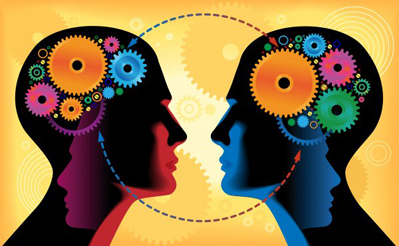|
The Integram:
an Integral Enneagram of Consciousness; a model of consciousness,
including all aspects, for designing practical paths of personal
development and evolution.
Quick Links: jump
to any section
Feature Article
No time?
Listen
to the
podcast
(7:27
min.)
in the background while you file, exercise, ride to work, etc.
Listen on
Soundcloud
Quick Communication Tip
Special Offers
Resource
Links
****************
Two Sides of Compassion
(click for
podcast)
Empathy vs. Objectivity
Empathy and objectivity seem to be incredibly different at first
glance. Empathy is all about your
mirror neuron
systems
doing their jobs
in the insula region of the brain, causing you to have experiences
internally that match what you are viewing or hearing externally. You
feel sadness take you over when watching someone experiencing deep grief
and loss. You wince in reaction to seeing someone else being kicked in
the head. When you see someone grasp a glass off a table, you can
somehow “tell” whether they’re going to drink it or they’re clearing the
table. These are the basic building blocks of empathy. The more
developed and complex our mirror neuron systems are, the more empathic
we are.
Objectivity seems to be the opposite of empathy. It’s a place where you
don’t connect to the person having the experience, you merely observe
it. You don’t “feel” their feelings, you observe them. Although the
lack of reaction could be considered cold or detached, there is a way
that this objectivity can be an important part of compassion. Just as
empathy can incite compassion for someone having an experience you can
“feel,” objectivity can incite compassion for someone having an
experience you can’t possibly understand. Rather than coming from our
own feelings, we can recognize someone else having their own experience;
one that we may not be able to relate to or feel ourselves.

The place where these very different approaches intersect in compassion
is in their shared “detachment from judgment.” When we put ourselves in
the position of the other person having an experience, we can bring a
lot of baggage with us. This is where we run into problems, especially
in communication. The worst thing we can do (and we tend to do this
quite unconsciously) is to introduce “logic and reason” in the form of
huge assumptions. The most common way we do this is the little phrase:
“if it were me saying or doing that, it would mean ___________.” It
isn’t us, and we’re almost always wrong. This is not using our mirror
neurons to “feel” what the other person is feeling. This is using false
objectivity, or straight detachment. We observe, then we create a
rationale to explain the observation. This detachment is very
problematic.
The only detachment that works, is detachment from judgment. This is
where we don’t make evaluated assessments of another person’s
experience. Making those judgments is usually us using our brain to
protect ourselves from our heart, because we’re afraid of those feelings
we don’t understand crashing over us like a tidal wave. We physically
(or emotionally) push back in our chairs and say, “they shouldn’t feel
that,” or make a crack like, “what kind of a wimp tears up watching a
commercial?!” Without that judgment, we can be objective, and allow for
the person to have the experience they’re having. Allowing them to have
their experience without having to defend themselves is a perfectly
valid form of compassion that requires no empathy or mirror neurons.
This is the compassion that even someone with autism or Asperger’s
Syndrome can offer. Just making that space.
The Law of Allowance
The “Law of Allowance” is using empathy and objectivity to allow
the other person to be who they are. This sounds deceptively easy and
obvious, but it is one of the most powerful practices my clients learn.
We have many reasons for why we don’t simply do this naturally. We want
people to be a certain way. We want them to be like us, or predictable,
or be what we’ve projected them to be, or simply to make “sense” to us
the way we see things. To just let them be whoever they really are
could be devastating to the story we’ve been telling ourselves; the
story that has supplanted reality. The story that we have built our
play around.
Using our natural abilities to “feel” each other, we can let our
judging, evaluating, discerning brains work on something else; something
logical, rational, linear, and suited to the job of the brain. We can
“feel” someone not understanding a procedure, and adjust our
description, rather than becoming annoyed at them for not getting it.
We can “feel” the effect we’re having on someone, and rather than using
our detached, protective brain to assess what’s “wrong with them,” we
can check in and learn something real. We can make all the
micro-adjustments in our interactions that replicate the
micro-adjustments of equilibrium, and achieve that same kind of balance.

Our communication, when raised to this level of consciousness, connects
us the way we are naturally designed to be connected. We are social
animals, with the most sophisticated mirror neuron systems of any
animals on the planet. Feeling each other is part of knowing each
other. We can communicate with other socialized animals who’ve learned
to “read” us for their own survival. If our dogs and cats can feel our
sadness, and provide the compassion we need, we certainly should be able
to do as well for each other. At the very least, we can give each other
the space to feel our own feelings, and think our own thoughts, without
the pressure to defend them.
Want to learn more about how to become the best you possible?
Come visit the
web site, or better yet,
contact me and see how we can design a program
to fit your needs and desired outcomes.
- Ian J. Blei
****************
Quick Communication Tip
The Check-in
How many times have you heard "never assume?" And yet, we still seem to
do it all the time in communication. We assume we know what someone's
going to say before they say it. We assume where the conversation is
going. We assume we've already had this conversation a million times
before, and so on. What these all have in common is that they completely
remove you from the actual conversation; either putting you into a past
situation with someone else, or just an alternate to where you are. I've
lost track of how many times someone has gone off on a tangent built
from the first five words of my sentence, and completely taken the
discussion off track, as I try desperately to pull them back to the
original point, or get locked in a battle defending what I really meant.
The solution is the simple, tried and true check in. Listen to the other
person without interrupting, and then ask them if you really understand
what they said. "When you said you need a vacation, did you mean in
general or from me?" I only use this silly example because for the most
part, people invent the worst possible way to take it, then make that be
what the other person "said," and then get into an argument. Totally
unnecessary and not fun.
Want to learn more about how your communication can hold you back or
catapult you forward? Come visit the
web site,
or better yet,
contact me and see how we can design a program to fit your needs and desired outcomes.
****************
February
Special Offer!
Valentine's Day
Special
Conscious Couples Session
on Sale
thru the end of February!
[CLICK
HERE FOR DETAILS]
"...After just one session, my
partner and I were able to move through conflict in a non-blaming and
curious way, eager to explore how our innate differences worked in our
relationship...As a psychotherapist, I would recommend this process to
the couples I see for relationship therapy..." - Shari Levine -
Licensed Marriage and Family Therapy, Portland, OR
Click to Schedule.
****************
Resource Links:
The Integram Archive
- the podcast series
Melissa Risdon's Raving Fan Radio Show:
Ian Blei on the
Integram
(TM)
-understanding
ourselves, each other, and our relationships
KG Stiles: "Conversations that Enlighten and Heal"
Ian Blei on Kind Ambition and the
Integram
(TM)
Kind
Ambition
-
2nd Edition
Got Blog?
come
visit the Blog.
****************
|
Welcome to the Integram, where consciousness meets
intentional design. Enjoy!

The Optimizer
Ian Blei,
Director of the
Institute for Integral Enneagram
Studies
and
President of
Optimized Results
415.826.0478
Kind Ambition
Click
HERE
Kind Ambition:
Practical Steps
to Achieve Success
Without Losing Your Soul
Kind Ambition
Fan Page
now on
FACEBOOK
Kind Ambition
is
about you having the tools to slide over to the driver’s seat of your
own life. Circumstances will always be changing, seemingly
thwarting our plans, but we don’t have to be thrown around by them. You
can be in charge of your choices and actions more than you might imagine
- yet.
Kind Ambition
is written for you, as
a practical guide you can use right now. It is a collection of
insights and actions designed to help you move forward and get more out
of your life at home and at work. The chapters hold to a formula
of first giving you a new way to look at things, then offering you
tangible Action Steps to try them out, and finally some things to notice
when you do.
Kind words for “Kind Ambition”
"If you are interested in success, whether it is in
running a large organization, a small business, or leading a satisfying
life, you will find a right blend of rules, wisdom and wit in a
digestible fashion that will serve to accomplish your objectives. The
notion that kindness can be blended with ambition and made to work and
serve the "bottom line" is enlightening, uplifting and satisfying."
-Steven Kiefel – CEO, Red Pill Media
“An easy to use guide for anyone who wants to achieve
real growth and success. His sensible and practical tactics solve
age-old challenges with real, how-to solutions. Best of all, Ian lives
his work!”
-Romanus Wolter - Author: Kick Start Your
Dream Business
Success Coach Columnist: Entrepreneur Magazine
Radio Host: Syndicated Kick Start Guy Segment
" We all face obstacles in our lives and careers. Some of
these come from within, subverting our conscious intentions. The good
news is: they can be overcome. The techniques and processes found
in this book will help you on your way."
-Margaret Heffernan – Author: The Naked Truth: A Working Woman's
Manifesto on Business and What Really Matters
Syndicated Columnist: Fast
Company Magazine
“A
scientifically-based, spiritually-awake, (and smart and funny) guide to
making the most of your life. Ian Blei provides the know-how, the
inspiration, the structure and all the tools you need in this
straightforward and inspirational book.”
-Lisa Betts-LaCroix, Past President of SF Coaches
Star
of Unapix film, “Dance Me Outside”
" Ian Blei shares his deep insights in simple and
straightforward ways. His work continues to inspire me whenever I
feel I'm getting stuck in some area of my life."
-Roy King, III
, Director Pacific
Development Partners
|

